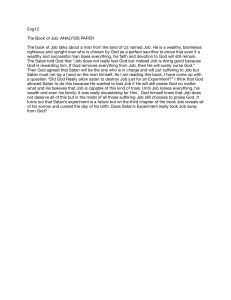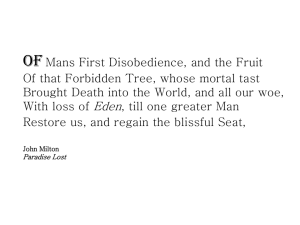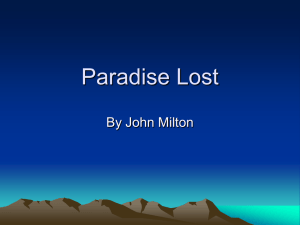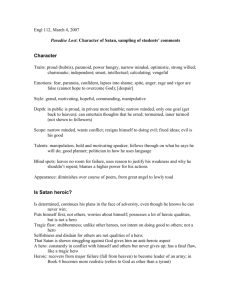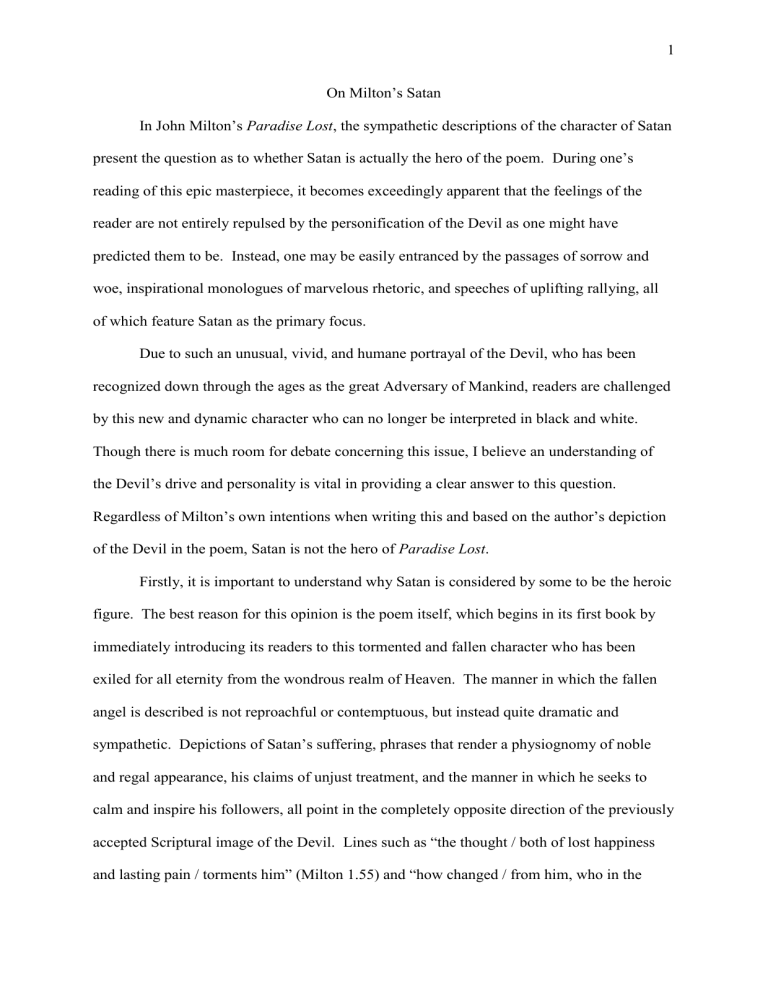
1 On Milton’s Satan In John Milton’s Paradise Lost, the sympathetic descriptions of the character of Satan present the question as to whether Satan is actually the hero of the poem. During one’s reading of this epic masterpiece, it becomes exceedingly apparent that the feelings of the reader are not entirely repulsed by the personification of the Devil as one might have predicted them to be. Instead, one may be easily entranced by the passages of sorrow and woe, inspirational monologues of marvelous rhetoric, and speeches of uplifting rallying, all of which feature Satan as the primary focus. Due to such an unusual, vivid, and humane portrayal of the Devil, who has been recognized down through the ages as the great Adversary of Mankind, readers are challenged by this new and dynamic character who can no longer be interpreted in black and white. Though there is much room for debate concerning this issue, I believe an understanding of the Devil’s drive and personality is vital in providing a clear answer to this question. Regardless of Milton’s own intentions when writing this and based on the author’s depiction of the Devil in the poem, Satan is not the hero of Paradise Lost. Firstly, it is important to understand why Satan is considered by some to be the heroic figure. The best reason for this opinion is the poem itself, which begins in its first book by immediately introducing its readers to this tormented and fallen character who has been exiled for all eternity from the wondrous realm of Heaven. The manner in which the fallen angel is described is not reproachful or contemptuous, but instead quite dramatic and sympathetic. Depictions of Satan’s suffering, phrases that render a physiognomy of noble and regal appearance, his claims of unjust treatment, and the manner in which he seeks to calm and inspire his followers, all point in the completely opposite direction of the previously accepted Scriptural image of the Devil. Lines such as “the thought / both of lost happiness and lasting pain / torments him” (Milton 1.55) and “how changed / from him, who in the 2 happy realms of light / clothed with transcendent brightness didst outshine / myriads though bright” (Milton 1.84) hint at the wistful thought that perhaps Satan’s punishment was too harsh. Even more appealing than Satan’s despair is his commanding demeanor and presence. One passage reads: “Above them all th’ Archangel; but his face / deep scars of thunder had intrenched, and care / sat on his faded cheek, but under brows / of dauntless courage, and considerate pride / waiting revenge: cruel his eye, but cast / signs of remorse and passion to behold / the fellows of his crime, the followers…condemned / forever now to have their lot in pain.” (Milton 1.600-608) In this passage, Milton appears to have completely done away with the image of a depraved Satan, so twisted in appearance and mentality that any sense of compassion and loyalty could not possibly linger in him. Yet here is this creature, immense and majestic, holding the place of burdened leader, depressed but undaunted and seeming to care for his suffering followers. How easy it is to switch one’s opinion of the Devil upon reading this! As Chad P. Stutz of Boston College writes, “While Satan may surely be read as a manipulative ruler, it is far more difficult to view him as an oppressive or brutal one” (216). One could think that the Devil is entirely misunderstood. If this is the case, then Satan could certainly represent freedom. The fact that Satan rebelled against God and led a third of his angels with him in the revolt elevates him to the rank of revolutionary leader, a champion for freedom, and the representative for the destruction of tyranny or dictatorship. Satan could not bear to be second to God. His desire to be free from any restraint, any form of accountability, is very relatable on a human level. Milton’s creation of a human image of Satan breaks down the supernatural barrier, providing the people of the earth with a common ground upon which 3 they may view Satan and relate to him as just one more person who desired emancipation and was consequently persecuted. On a different level, Satan’s frequent moaning and debates with himself regarding his attempt to usurp God’s throne are very pertinent. Satan is torn. How often are we, perturbed by our own conscience, pulled this way and that by conflicting desires! From a secular standpoint, Satan’s journey to Earth to orchestrate the fall of mankind can also be seen as a form of liberation. By leading Adam and Eve to partake of the forbidden fruit, he revealed to them a whole new world of life without subjection to God the Father, breaking the sphere of innocence in which the only two humans on Earth had previously dwelt. The attempt to justify Satan’s treachery stems easily from the knowledge that Satan saw a different way to the one God had previously mapped out for all His subjects. Satan deplored God’s reign and sought to “defy th’ Omnipotent to arms.” (Milton 1.49) Clearly, Satan had a different opinion, and in a world where diverse opinions are lauded, Satan’s thoughts and actions are worthy of a standing ovation. In this modern age of fighting for the rights of every man, one may salute this fallen angel who desired more than his allotted destiny. Even in the forsaken bounds of Hell, Satan remarks, “In my choice / to reign is worth ambition though in Hell: / better to reign in Hell, than serve in Heav’n.” (Milton 1.261-263) He expresses no repentance for his motive. He rejoices in his freedom, declaring that he can make Hell his own Heaven. The poet Percy Shelley applauds this version of Satan, stating that “Milton’s Devil as a moral being is as far superior to his God as one who perseveres in some purpose which he has conceived to be excellent in spite of adversity and torture” (Paradise Lost Vodcast: Satan as Hero). All these insights evince a heroic figure. Satan was unjustly punished for a different point of view, he remained steadfast and loyal to his cause despite his extreme banishment, and he becomes a 4 symbol of hope for those desiring freedom from the restraints of living under an authoritative God. However, if it is a possibility that Satan is the hero of Paradise Lost, the problem arises concerning the idea of heroism as society knows it. The definition of a hero is generally accepted to be someone who does something for the good or betterment of someone else. Typically, it is not a person who has selfish interests. A hero is someone who is “admired for achievements and noble qualities” and who “shows great courage” (MerriamWebster). Admittedly, Satan does show great courage. He not only braves the terrors and unknown regions of Hell, but actually stands up against the Almighty and challenges Him. He is obviously fearless. Yet how does he employ this fearlessness? To champion a cause? To lay waste to tyrants? No! The poem displays evidence to the contrary. These aforementioned theories and opinions of a position opposite to my own, although logical from a subjective point of view, are revealed to be askew when the text of Paradise Lost is studied. Although motives for rebellion often stem from feelings of oppression, in Satan’s case this was not so. Satan was not trying to usurp God because he felt that that was the best choice for his followers. When he and his demons land in Hell, there is no Declaration of Independence justifying the reasons for the challenge to God’s authority. This is because Satan still recognizes God as the Almighty. In Book 4 of Paradise Lost, Satan laments his actions, calling God the “matchless King” of Heaven and undeserving of his treachery (Milton 4.41). He goes on to say, “His good / upbraided none, nor was his service hard” (Milton 4.44). He is describing God as a fine ruler, blameless in every respect. This is so different from a hero who must contend with a villainous tyrant and strive to cut him down! The reason that Satan attempted to overthrow God was because he “trusted to have equaled the Most High” (Milton 1.40). Not only did he consider himself an equal in this 5 respect, but he strove to “set himself in glory above his peers” (Milton 1.39). By this, it is clear that Satan did not desire a status of equality but something far greater: superiority. Satan should not be regarded as a symbol of hope for the oppressed, because, by his own admittance, he was not rebelling against oppression. Even when Satan describes Hell as a potential place of freedom, this is an expression of jubilation because he finally has his own kingdom, even though his new dominion is Hell. Submission to God would have been far greater torment because Satan cannot bear to be even slightly inferior. For him, repentance is more bitter than an eternity of damnation. This also eradicates the theory that Satan deserves our sympathy because he is suffering. Satan is very happy in his new home. He deserves no sympathy, because, not only does he not require any, but his situation is a self-proclaimed improvement upon the golden streets of limitation in Heaven. Although Satan is a leader, he lacks the moral verve of a heroic captain. He attempts to encourage his fellow demons and assure them that all is not lost, even though he knows that it is. By his own admittance, he will not be going down on bended knee before his Godly foe and asking for a second chance, so everyone’s future is certain and desperate. The legions will burn for eternity. If Satan was the hero, then his purpose would be to act upon a plan for the betterment or help of either his fellow demons or humanity, who could also be considered subservient to God and therefore in need of freeing. Satan fails on both counts. The Devil insists that “all is not lost” (Milton 1.106), but his idea of hope is the avenue of revenge and hate, by which means he plans to somehow regain a little satisfaction. In Book 1 he explains the future when he says of God’s creation of mankind, “If then his providence / out of our evil seek to bring forth good, / our labor must be to pervert that end, / and out of good still to find means of evil” (Milton 1.162). Prior to this, he also states that “to do aught good never will be our task” (Milton 1.160). This is not redemption or hope. This is dark and hollow revenge, through which campaign the Devil’s only personal gain will 6 be the bleak assurance that God’s marvelous creation of mankind will fail to live out its beautiful purpose of bringing the Father glory. For his followers, Satan has no answer, except to attain a world of sinners to share Hell with. As to humanity, he will do all in his power to bring them down from their position of happiness. Finally, this very declaration from the Devil’s mouth to doom every human on the planet proves that he is not the hero of Paradise Lost. Satan’s reasons for this plan of attack are two-fold: he wishes to punish God for banishing him to an eternity of suffering, and he wants to deprive mankind of hope just he was deprived of it and replace that hope with the epitome of anguish. When Satan travels to Earth, reaches the Garden of Eden, and alights on the Tree of Life, the poem tells us that he sits there, “devising death to them who lived” (Milton 4.197). Those who claim Satan as their muse, their emancipator from the bondage of religion – how can they justify this uttered curse? It is unjustifiable. There is nothing heroic about it. Even if a human being believed that Satan’s influence helped him to live the life he wanted to live, the fact remains that the Satan of Paradise Lost wanted to ruin mankind. Not only is Satan’s plot despicable, it is not enduring. Although this is beneficial from a human perspective, if Satan was an individual worthy of being hallowed in the annals of heroes, surely his plan would affect mankind irrevocably and provide no means of intervention. Paradise Lost clearly shows that the very opposite is possible. God foresees the fall of Adam and Eve and sends Jesus Christ to pay the price for their sin. Not only does this wipe away all sin, but it provides a chance for salvation through belief in Christ with the reward of spending eternity in Heaven. More than being an understanding from a biblical standpoint, the poem prophesies the coming of the Son who will undo Satan’s scheme. As Book 3 reads: So man, as is most just, / shall satisfy for man, be judged and die, / and dying rise, and rising with him raise / his brethren, ransomed with his own dear life. / So heav’nly love 7 shall outdo hellish hate, / giving to death, and dying to redeem, / so dearly to redeem what hellish hate / so easily destroyed, and still destroys / in those who, when they may, accept not grace.” (Milton 3.294-302) This describes the downfall of what Milton’s Jesus calls Satan’s “mortal sting” (3.253) In conclusion, Satan shows no traits of a hero. His sympathetic portrayal is made null and void by his identity of darkness that Milton never lets his readers forget by continually labeling him with negative epithets. The claim of his unjust suppression is contradicted by Satan’s own admission of an easy life in Heaven. When the figure of battle-scarred and careworn general is removed, a tormented and selfish dictator is laid bare as one who would rather exist forever in a fiery pit with his legions than declare fealty to a Higher Being and who is incapable of redeeming himself and those cursed with him. And lastly, the interpretation of the Devil as the liberator of the human race is rendered invalid by Satan’s resolute and public plan to destroy mankind. Each of these contradictions of the character and creed of a hero leads to the conclusion that Satan is not the hero of John Milton’s Paradise Lost. 8 Works Cited “Hero”. Merriam-Webster. Retrieved from: https://www.merriam-webster.com/dictionary/hero. Accessed 20 November 2017. Milton, John. Paradise Lost. The Norton Anthology of English Literature. Ninth edition. Edited by Stephen Greenblatt, Norton & Company. 2012, pages 1947, 1948, 1950, 1952, 1960, 1992, 1993, 2004, 2007. “Paradise Lost Vodcast: Satan as Hero.” Youtube, uploaded by The School of English at the University of Sheffield, 21 Feb 2017, https://www.youtube.com/watch?v=dsBFoC9xZEM Stutz, Chad P. "No "Sombre Satan": C. S. Lewis, Milton, and Re-Presentations of the Diabolical." Religion & the Arts, vol. 9, no. 3/4, Sept. 2005, pp. 208-234. EBSCOhost, doi:10.1163/156852905775008804.

